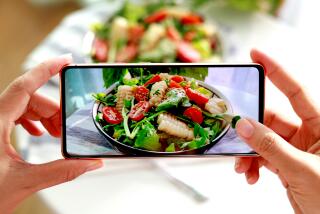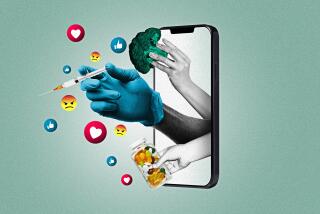A Healthy Dose of Reality : Experts Say Myths Limit Enjoyment of Some Foods or Lead to Unhealthful Habits
- Share via
If you don’t eat butter because you think it’s bad for you and shun eggs for the same reason, you may be surprised to find that you’re a victim of nutritional misconceptions. Don’t feel bad, say experts; you’re one of many.
“Even though Americans know a great deal more about nutrition today than ever before, myths still abound,” says registered dietitian Becky Posada of St. Joseph Hospital in Orange.
Although some food myths are harmless, others are more unhealthy, and some simply limit people from enjoying certain foods, such as butter and eggs.
Here, several dietitians address 10 major nutritional myths with correct information.
* Myth: Butter is an unhealthy choice.
“The truth is, butter is much better for you than margarine,” says Deborah Underwood, a nutritional biochemist based in Ohio, who consults with Orange County physicians.
“Unlike margarine, which is completely man-made and has no nutritional benefits, butter is natural and has medicinal properties,” she says. “It is made up primarily of butyric acid, which is credited with anti-cancer and anti-viral properties and may even help in the prevention and/or treatment of Alzheimer’s disease. In contrast, margarine has been connected with causing cancer.”
If you’re worried that using butter instead of margarine will put on the pounds, don’t.
“Many people are under the mistaken impression that margarine contains less fat than butter,” says Sharon Rank, RD, a nutrition consultant in Laguna Beach who consults with local physicians and provides wellness workshops for corporations.
“The only difference between the two is that margarine contains no cholesterol; they both have the same amount of fat, which is about 12 grams per tablespoon.”
Because butter is high in fat and does contain cholesterol, dietitians and nutritionists recommend that you keep your daily intake to 2 to 3 teaspoons a day, and your overall daily fat intake should be less than 30% calories from fat.
* Myth: Eggs aren’t good for you.
“It’s strange how eggs have gotten such a bad rap,” says Susan Kishiyama, RD, who teaches a nutrition course at Orange Coast College. “Eggs have always been good for you. Eating eggs a couple of times a week as your main source of protein is fine. They’ve even recently found that eggs have less cholesterol than previously thought.”
* Myth: Starchy foods are fattening.
Complex carbohydrates such as potatoes, rice, breads, pastas, beans and popcorn are actually low in fat, Posada says. “These foods only become fattening when you add high-fat toppings like salad dressing, sour cream, peanut butter and butter.”
Starchy foods are also very good for you. As a matter of fact, you should increase your intake of these foods, not shun them. “According to new recommendations, each person should eat six to 11 servings per day of complex carbohydrates,” Posada says. “They are a great source of energy without the fat and an excellent source of fiber.”
Instead of using high-fat toppings on starchy foods, try some of the new low-fat and nonfat products on the market. There is nonfat cream cheese for bagels and nonfat mayonnaise for pasta and potato salads. Cook your own dried beans or look for vegetarian beans or chili that are fat free. You can also add spices to foods for a different taste.
* Myth: Milk does a body good.
Recent evidence has shown that the large quantities of milk consumed in the United States may not be so good after all.
“Even though the American Dietetic Assn. recommends two servings or more of milk per day, many people find it difficult to meet that requirement because of lactose intolerance--they don’t have the necessary enzyme to break down milk sugar,” says Leslie Butz, RD, a dietitian in private practice with Family Medical Center in Mission Viejo.
“There is also evidence that the homogenization process used for milk in the United States creates tiny fat molecules that our bodies may not know how to metabolize, and this is leading to increased deposits of plaque in the arteries,” she says.
And although milk is often consumed to prevent osteoporosis, excessive amounts may actually lead to the disease. “Studies show that when we eat too much protein, we excrete calcium in the urine,” Butz says. “Milk is very high in protein, as is the rest of the average American diet.
“This calcium excretion may explain why though American women get more calcium than women in other countries, we have a much higher rate of osteoporosis here,” she says.
* Myth: Vitamins give you energy.
Many people pop a vitamin in the morning thinking they’re giving themselves an energy boost for the day. The truth is, the only thing that will give them energy is a good breakfast.
“Energy is synonymous with calories,” Posada says. “The only place you can get energy in the diet is from nutrients that have calories. These nutrients are carbohydrates, protein, fat” and alcohol.
If you take vitamins, make sure they don’t exceed RDA requirements, because an overabundance of some vitamins such as A and D can be harmful, Posada says. These vitamins aren’t filtered out of the body, but are stored in the liver and can reach toxic levels if you ingest too much.
* Myth: Amino acid protein supplements are needed to build muscles.
“Many weightlifters use amino acid protein supplements to build muscle mass,” Butz says. “The truth is, muscle is created by effort, not amino acids.
“Amino acids are also not very good for athletes because they’re very high in protein and therefore too hard on the kidneys,” Kishiyama adds.
* Myth: To lose weight, you must cut calories.
“Cutting calories is not the answer to weight loss,” Posada says. “As a matter of fact, women need to eat no less than 1,000 to 1,200 calories a day and men 1,500 to 1,600. When you don’t eat enough calories, your metabolism slows down and weight loss becomes more difficult.”
The secret to losing weight is to count fat grams. Make sure that no more than 20% to 25% of your calories come from fat each day.
* Myth: Cheese and crackers and similar snacks are healthy choices.
“While a few cheese and crackers do provide some health benefits, the truth is that many such snack items contain a great deal of hidden fat,” Rank says. “Just five crackers topped with Cheddar cheese have 14 grams of fat, and who stops at five crackers? Eating such snacks makes it easy to exceed your maximum fat intake for the day. Men should eat no more than 50 to 60 grams of fat daily and women no more than 24 to 40.”
As an alternative to common cheese-and-cracker snacks, Rank suggests Melba toast with mozzarella or nonfat cheese.
Other snack alternatives suggested by Posada include pretzels, which have just one gram of fat per ounce; rice crackers, one gram per ounce, air-popped popcorn, one gram per three cups (without butter) and fat-free foods such as fruit and vegetables, nonfat yogurt and cottage cheese.
* Myth: Chicken and fish are lower in cholesterol than beef.
The truth is poultry and fish have the same amount of cholesterol as beef. “There are 72 milligrams of cholesterol in three ounces of dark turkey meat and 72 milligrams in three ounces of ground chuck,” Posada says.
This doesn’t mean, though, that poultry and fish aren’t a better food choice. Although the cholesterol is the same, the fat content isn’t. The same turkey piece only has 6 grams of fat, compared with the ground chuck, which has 16 grams.
* Myth: As long as they’re diet, soft drinks are harmless.
The truth is, any type of soft drink is dangerous, especially for women.
Soda is high in phosphoric acid, which interferes with the body’s ability to break down and use calcium, Butz says.
Research done at the Harvard School of Public Health showed that regular soda drinkers may have a tendency toward the weak and brittle bones associated with osteoporosis. They surveyed 2,622 women who were active athletes in college and found that those who regularly drank soft drinks were twice as likely to suffer from bone fractures as those who rarely drank soda.


